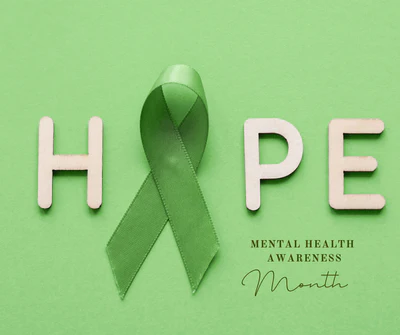
May is Mental Health Awareness Month
Mental Health is an incredibly important part of overall health. When you’re mentally healthy, you are able to enjoy your life and the people in it, feel good about yourself, keep up good relationships, and deal with stress.
It’s normal for your mental health to shift over time – we all face difficult situations in our lives. Creating positive habits is a great way to support your mental health when you’re doing well, and helps you build skills to use if you do face symptoms of a mental health condition.
LET'S TALK STRESS
Everyone has it. Stress is a normal part of life. You can feel physical stress in your body like when you have too much to do or when you haven’t slept well. You can also feel mental stress like when you worry about things like your job, money, relationships, or a friend or family member who is struggling with illness or difficult circumstances.
When you are constantly reacting to stressful situations without making adjustments to counter the effects, you will feel stress which can threaten your health and well-being.
STRESS MANAGEMENT
It is essential to understand that external events, no matter how you perceive them, those events may cause stress. It can often accompany the feeling of “being out of control.” The key is determining your personal tolerance levels for stressful situations, and know that it can affect your health, vitality, peace-of-mind, as well as personal and professional relationships.
Sometimes we can easily get to the root of the issue and squash it; other times we need coping methods to manage and alleviate that stress.
Here are six ways you can reduce stress and get back to mindful and meaningful living:
1. Make time to exercise - go for a walk, jog, practice yoga, or go the gym.
2. Get consistent sleep every night
3. Meditate often - meditation and mindfulness can help counteract the biological responses of stress, like increased blood pressure and pulse rate, faster breathing and increased blood flow to muscles aiding you in controlling stress and decreasing anxiety.
4. Talk with a mental health therapist or psychologist
5. Schedule out some 'Me Time' with regular massages or reflexology.
6. Practice better time management - those who plan ahead tend to feel less stressed.
Taking the time to focus on mindfulness and self-care can greatly impact overall health, wellbeing, and ability to manage stress. Proper sleep, regular exercise, intentional breathing, and planning ahead should all be tools in our modern-day toolbox.
SUPPLEMENT SUPPORT FOR STRESS MANAGEMENT
There is a long history of evidence suggesting that the use of herbal supplements is a safe and effective way to support a healthy stress response. Herbs like Ashwaganda, Licorice Root, Turmeric and others can assist in the management of stress. Talk with one of our healthcare providers about how you can include supplements such as: *Metagenic's MyoCalm®, Serenagen® or Exhilarin® into your personalized stress resilience plan.Give us a call 716-631-3555 x4256.
*These products have not been evaluated by the Food and Drug Administration. These products are not intended to diagnose, treat, cure, or prevent any disease.
Save 10% Use Code: INV10
Start your account today and have your products shipped to your door.
NEED HELP?
Help may be as close as a friend or spouse. But if you think that you or someone you know may be under more stress than just dealing with a passing difficulty, it may be helpful to talk with your doctor, spiritual advisor, or employee assistance professional. They may suggest you visit with a psychiatrist, psychologist, social worker, or other qualified counselor.
If you have goals to improve your health, we have the resources and positive atmosphere to support you - give us a call 716-631-3555 x4256.
